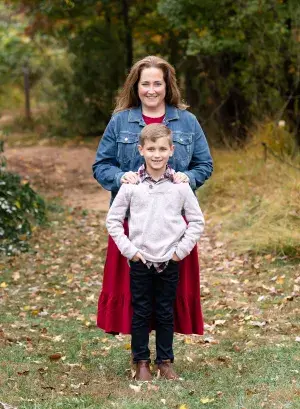 Human Capital Branch Chief Kathy Carnevale with her son, Sam. (Photo courtesy of Kathy Carnevale)
Human Capital Branch Chief Kathy Carnevale with her son, Sam. (Photo courtesy of Kathy Carnevale)
TSA Human Capital Branch Chief Kathy Carnevale has an intensity in her voice when she speaks about insurance plans offered in the 2023 Federal Employee Health Benefits (FEHB) program.
Carnevale, who oversees the staff responsible for retirement benefits, is especially enthusiastic about new health plans covering assisted reproductive technology (ART) benefits. The federal government has added four new plan options to the existing benefit packages, providing a total of 19 distinct choices in 2023.
The CDC defines ART as including all fertility treatments in which either eggs or embryos are handled.
“Someone today will learn they are living with the diagnosis of infertility,” said Carnevale. “There's so many people who don't even try to build their family because they just can't afford it. This insurance makes it easier for people to pursue treatment. To be able to give hope to someone and offer something that might make it easier and better for them to build their family is a really big deal.”
Carnevale, who’s 8-year-old son Sam recently participated in his first field trip since returning to in-person learning, knows just how big a deal this new insurance is. Sam is the product of Carnevale’s fourth round of in vitro fertilization (IVF).
“I remember that day (I learned about my infertility diagnosis),” recalled Carnevale. “I remember how hopeless I was and how worried and scared that I would never have children. And that's terrifying.”
Doctors offered her a sliver of hope in the form of IVF, but neither she nor her husband had ART coverage at the time. “One round of IVF with the medication can run you up to $20,000 a cycle,” said Carnevale. Because of the eye-popping price tag, they reluctantly “pumped the breaks” on growing their family.
Carnevale points out the medical intervention is not foolproof.
“The only thing it gives you is a chance,” said Carnevale. “There’s no guarantee a cycle will work. It buys you a shot. That’s why this insurance coverage is everything (to a family with infertility issues). It allows you to go through multiple cycles if that’s physically possible, to change your medication protocols and not have to worry about the financial burden.”
Not deterred, her husband’s intentional job searches helped him transition into a position with insurance covering five rounds of IVF - an unheard of benefit 10 years ago - providing them options.
“I really think it (ART insurance coverage) opens up your choices and gives you back control over how you decide to build your family,” said Carnevale. “I’ve volunteered in the infertility community for many years now, and I have friends who have children who come from surrogates, gestational carriers, donor sperm, adoption, foster care – all kinds of ways. How you create your family is a personal choice.”
She conceded luck and timing played huge roles throughout her IVF procedures and, even with the finances covered, the process was, at times, overwhelming.
“We did IVF for almost four years, and in the middle of it, I was diagnosed with thyroid cancer. I had my thyroid removed and went through radiation, so that prolonged the process even further,” said Carnevale, who admitted to emotionally ‘checking out’ during her fourth round of IVF.
“We had actually resigned ourselves to a life without a child and were planning to move out of our house and rent a condo in the city,” recalled Carnevale. “A week after we sold our house, I found out I was pregnant. Sam is the product of my fourth round of IVF. I have the date burned in my brain. It was April 20, the last day I did an embryo transfer. It was the day my child was born in that embryology lab.”
Carnevale acknowledges the support group RESOLVE for keeping her positive and on track during her four difficult rounds of IVF.
“I was part of that online support group. I don’t know how I would have survived without those people. Knowing that I could talk to others who were going through what I was going through was really important to my process.”
Their credo, “We believe all people challenged in their family building journey should reach their resolution by being empowered by knowledge, supported by community, united by advocacy and inspired to act,” spurred Carnevale’s advocacy for this cause.
“After I had my son, I did a lot of volunteer work with RESOLVE,” she said. “I went to Capitol Hill to advocate for the family building law for five years in a row before COVID-19 slowed in-person hearings.”
For Carnevale and her husband, the challenges of parenting are tempered by their infertility experience.
“I can’t even complain about it,” said Carnevale. “We tried so hard for this. It helps me remember, even in the frustrating moments of parenting – the attitude and eye-rolling of an 8-year-old – how lucky we are.”
Carnevale’s personal journey helps explain her eagerness to spread the word about the new federal health plans and the impact ART coverage will have on TSA employees who struggle with infertility.
“The emotional roller coaster is real,” said Carnevale. “You’re already at a point of desperation when you start down the ART process. Can I afford it? Do I have time off at work? It’s a constant anxiety and a worry. For officers, especially if you’re working shift work, it’s stressful requesting time off to go to the 8 million doctor appointments.”
Lifting the prohibitive financial burden with insurance coverage gives families an opportunity to explore their options.
By Karen Robicheaux, TSA Strategic Communications and Public Affairs


